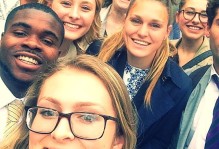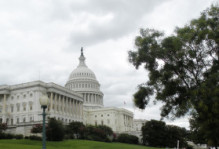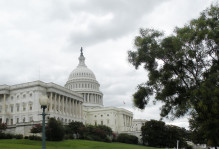Michelle Selim’s Reflection on DC Summer Institute – Leadership and Life Purpose
Guest blogger: Michelle Selim reflects on her summer in DC. Michelle was a part of the DC Summer Institute on Leadership and Community Engagement. The W&M Washington Office coordinates the Institutes.
This summer in Washington, DC has been a whirlwind of experiences with both highs and lows, but I don’t believe I could trade it for much else. My internship at a think-tank has allowed me to consider many of the latest ideas and theories of international development including foreign aid effectiveness, government contract, and private sector-led development. I have also had time to reflect on personal thoughts on life after William and Mary as this internship does provide a window into that world. Within this realm of thought, our class on leadership, personal development, and community engagement has also provided many ideas to chew on.
Over the past couple of months, I have done quite a bit of observing and watching the different dynamics of our office. My two supervisors are very personable and always make everything feel like a team effort. They both have their own leadership styles; one is more of a go-with-the-flow type of person, but always gives feedback on how everything is completed after assignments. The other has his own style of leadership being the quieter of the two. He is quite soft-spoken, but I can always count on him for a great discussion about current issues and world events. Andrew also knows how to lead by example, he stays late after everyone leaves and stays focused on his work and research.
I have also been able to discover my own leadership style which has been part of my journey of self-discovery and reflection. I like to have everything planned out with to-do lists, etc. to make sure things run smoothly. I found that I value emotional intelligence in a leader and I hope that I can develop this characteristic as well. Emotional intelligence draws on a person’s strong sense of empathy, motivation, self-regulation, self-awareness, and social skills. A key aspect of this is the ability of a leader to convey the sincerity and passion for their work, which translates into enthusiasm by others and a willingness to engage. The ability to empathize with others goes deeper than being able to relate to others, but emphasizes personal connections with people. To many in DC this has come to mean “networking,” however I have realized that it refers to relationships with others, not just happy hour mingling or exchanging business cards, but really getting to know people. Emotional intelligence also relies on self-regulation and self-awareness to make a good leader. Self-awareness refers to someone’s sense of strengths, weaknesses, direction, feelings, values, and objectives. Self awareness lends itself to help a person understand how to best merge their passions with their work, a concept we covered heavily in class. Professor Drew Stelljes stressed that there should not be a need for a work-life balance if you marry your interests and your career. Personally, I am still looking to reach this state of self-awareness and find the perfect combination of work and the social issues I am interested in.




No comments.
Comments are currently closed. Comments are closed on all posts older than one year, and for those in our archive.